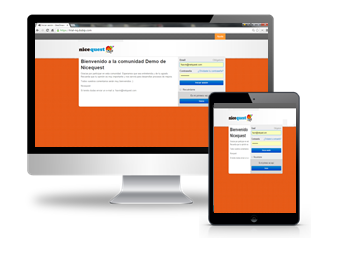Innovate. A verb we all know and have heard before. It means changing or modifying something, introducing something new. So, if we are familiar with this word, why is it that innovating seems to be something complicated? Perhaps, because adapting to changes is not that easy for everyone.
The same goes for market research, considering our industry has a wide history. In order to understand people’s opinions and behaviors it has followed certain techniques.
 To innovate or renew something it all starts, worth the redundancy, from the beginning. If we experience new things we can get an idea of whether we like them or not, or if they are processes or tools that fit our needs.
To innovate or renew something it all starts, worth the redundancy, from the beginning. If we experience new things we can get an idea of whether we like them or not, or if they are processes or tools that fit our needs.
Today we will talk about something new: online focus groups. A focus group is an interaction between individuals. A gathering of people in which a specific topic is debated or discussed. In a previous blog, we covered more details about this methodology.
On this occasion, we share an evaluation with the pros and cons of online focus groups. With this approach, you can evaluate for yourself if you want to start this new adventure.
Pros
-
Doing the focus group online is a faster alternative compared to the face-to-face focus group. Also, you don’t need to have a physical space or venue to do one.
-
In a face-to-face meeting, social norms are understood and always in effect. The digital ecosystem encourages people to feel comfortable. Therefore, their opinions are much more honest.
-
They are much more flexible. This flexibility helps making groups of people more diverse. Because location or time barriers are overcome. People can connect wherever they are, as long as they have wifi.
-
Technology to make research easier. Online focus groups help to increase efficiency and even get more interesting insights than the ones you could obtain in person.
-
Facilitates participation. The online environment encourages the dialogue with many people.
Cons
-
Capturing facial expressions and observing body language is more difficult.
-
The interaction among people, many times, is not so easily achieved. Which is why the moderator needs to try harder to generate it.
-
It is more difficult to know when people do not understand a question or if they are confused. Unless they say it explicitly.
-
Participants attention can be lost more easily. Our suggestion is to use an attractive platform which also promotes interactivity.
How do we do it at Netquest?
 Netquest takes care of recruiting the participants you are looking for. We do this through our online access panel. From there, we select the panelists who meet the profile you need.
Netquest takes care of recruiting the participants you are looking for. We do this through our online access panel. From there, we select the panelists who meet the profile you need.
We have a commitment to our panelists and this is a priority for us. For this reason, we also manage the incentives to be delivered to the people who finally attend the session. We do not only manage them, but we also deliver them directly in the Korus format (Netquest points that can be redeemed in our online store).
We want to give you all the facilities so you can do online focus groups. We use Webex technology, a platform that allows you to connect up to 100 participants. Still, our suggestion is to hold groups of a maximum of six participants. If you need the group moderation service, we can help you outsource a moderator.
Finally, in terms of length, we recommend the session or sessions you organize are not longer than one hour.
Ready, set, go!
With everything you have read this far, you have in your possession the basic knowledge. With this knowledge, you can move into practice! Remember, focus groups are one of the most used tools for qualitative projects. Now you can combine what you already knew with the benefits of the digital ecosystem. So, it's time to try online focus groups!
If you have questions or want to know how we can accompany you on the road, write us so we can chat about it.




